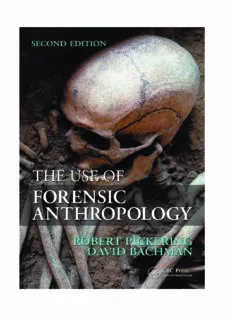Table Of ContentTHE USE OF
FORENSIC
ANTHROPOLOGY
SECOND EDITION
THE USE OF
FORENSIC
ANTHROPOLOGY
SECOND EDITION
ROBERT PICKERING
DAVID BACHMAN
Boca Raton London New York
CRC Press is an imprint of the
Taylor & Francis Group, an informa business
CRC Press
Taylor & Francis Group
6000 Broken Sound Parkway NW, Suite 300
Boca Raton, FL 33487‑2742
© 2009 by Taylor & Francis Group, LLC
CRC Press is an imprint of Taylor & Francis Group, an Informa business
No claim to original U.S. Government works
Printed in the United States of America on acid‑free paper
10 9 8 7 6 5 4 3 2 1
International Standard Book Number‑13: 978‑1‑4200‑6877‑1 (Hardcover)
This book contains information obtained from authentic and highly regarded sources. Reasonable
efforts have been made to publish reliable data and information, but the author and publisher can‑
not assume responsibility for the validity of all materials or the consequences of their use. The
authors and publishers have attempted to trace the copyright holders of all material reproduced
in this publication and apologize to copyright holders if permission to publish in this form has not
been obtained. If any copyright material has not been acknowledged please write and let us know so
we may rectify in any future reprint.
Except as permitted under U.S. Copyright Law, no part of this book may be reprinted, reproduced,
transmitted, or utilized in any form by any electronic, mechanical, or other means, now known or
hereafter invented, including photocopying, microfilming, and recording, or in any information
storage or retrieval system, without written permission from the publishers.
For permission to photocopy or use material electronically from this work, please access www.copy‑
right.com (http://www.copyright.com/) or contact the Copyright Clearance Center, Inc. (CCC), 222
Rosewood Drive, Danvers, MA 01923, 978‑750‑8400. CCC is a not‑for‑profit organization that pro‑
vides licenses and registration for a variety of users. For organizations that have been granted a
photocopy license by the CCC, a separate system of payment has been arranged.
Trademark Notice: Product or corporate names may be trademarks or registered trademarks, and
are used only for identification and explanation without intent to infringe.
Library of Congress Cataloging‑in‑Publication Data
Pickering, Robert B.
The use of forensic anthropology / Robert B. Pickering and David Bachman.
‑‑ 2nd ed.
p. cm.
Includes bibliographical references and index.
ISBN 978‑1‑4200‑6877‑1
1. Forensic anthropology. I. Bachman, David C. (David Charles) II. Title.
GN69.8.P53 2009
614’.17‑‑dc22 2008033792
Visit the Taylor & Francis Web site at
http://www.taylorandfrancis.com
and the CRC Press Web site at
http://www.crcpress.com
ἀ is book is dedicated to Triena Harper
with whom both authors worked for many years—
her service in the Jefferson County (Colorado)
Coroner’s Office exemplifies the dedication,
compassion, and professionalism that inspire us all.
Table of Contents
Preface xi
Acknowledgments xv
The Authors xvii
Contributors xix
1 Introduction 1
2 “Some Bones Have Been Found” 7
Setting the Scene 8
Scenario One 8
Scenario Two 10
Nine Key Points to Remember When Skeletal Remains Are
Discovered 1 3
3 What the Forensic Anthropologist Can and
Cannot Do 1 5
Finding a Forensic Anthropologist 1 5
What the Forensic Anthropologist Can Do 1 7
How to Find a Forensic Anthropologist 2 6
Establishing the Ground Rules 2 9
Letters of Agreement 3 2
The Case Report 3 5
Case Report Samples 3 6
4 Techniques for Recovering Skeletonized
Human Remains 4 5
Equipment Requirements 4 5
“I Think There’s a Skeleton Buried in This Field” 4 7
“Here’s a Bone, We Have a Problem” 5 0
“Hey Doc, What’s in the Box?” 54
The Forensic Anthropologist and Recovery of Remains 5 7
Field Recovery 6 7
vii
viii Table of Contents
The Final Report 6 7
Things You Can Do to Make Recovery Easier 6 8
5 Ten Key Questions 7 1
Question 1: Is It Bone? 71
Question 2: Is It Human? 7 4
Question 3: Is It Modern? 7 5
Question 4: What Bones Are Present? 8 1
Question 5: Is There More Than One Person Present? 8 1
Question 6: What Is the Race, Ethnicity, or Cultural Affiliation? 8 2
Question 7: What Is the Sex? 8 4
Question 8: What Is the Age? 90
Question 9: What Is the Stature? 9 7
Question 10: What Are the Individual Characteristics of the
Remains? 9 9
Summary 101
6 Assessing Ancestry (Race) from the Skeleton 103
George W. Gill
What Is Race, Ethnicity, or Cultural Affiliation? 104
What Methods Are Used to Establish Ancestry/Race from
Bones? 107
How Accurate Are Assessments of Ancestry/Race from Bones? 109
Conclusions 110
7 Determination of Time since Death 113
The Body 115
The Microenvironment 116
Eight Essential Environmental Categories of Information 118
8 Special Techniques: Their Value and Limitations 121
Facial Reconstruction 121
Direct Facial Reconstruction 122
Craniofacial Superimposition 128
Video Superimposition 129
Footprint Impression Analysis 129
Osteon Counting 130
Bitemark Analysis 131
ABO Blood Typing 132
Forensic Toxicology 133
Table of Contents ix
14C Dating 134
DNA Testing 134
9 An Introduction to Forensic Science and DNA 137
Heather Miller Coyle
Forensics Defined 137
What Is DNA? 138
Benefits and Limitations of DNA 141
DNA Databases 141
The Future of Forensic DNA 142
References 143
10 Skeletal Trauma and Identifying Skeletal
Pathology 145
Antemortem Trauma 145
Perimortem Trauma 149
Postmortem Trauma 151
Pseudotrauma 155
Pathologic Changes in Bone 159
Follow-Up Steps for Skeletal Abnormalities 167
11 Putting Your Case Together 169
Closing the Case, Closing the Book 171
Appendix: Report Forms 177
Human Remains Investigation:
General Information 181
Contextual Description 182
Recovery Area 183
General Description of Remains 184
Inventory 186
Photo and Video Inventory 187
Glossary 189
Bibliography 193
Index 195
Description:A forensic investigation requires a team of specialists from many different scientific fields of study along with legal and law enforcement specialists. In recent years, the range of cases on which forensic anthropologists have been consulted has expanded dramatically. The Use of Forensic Anthropolo

